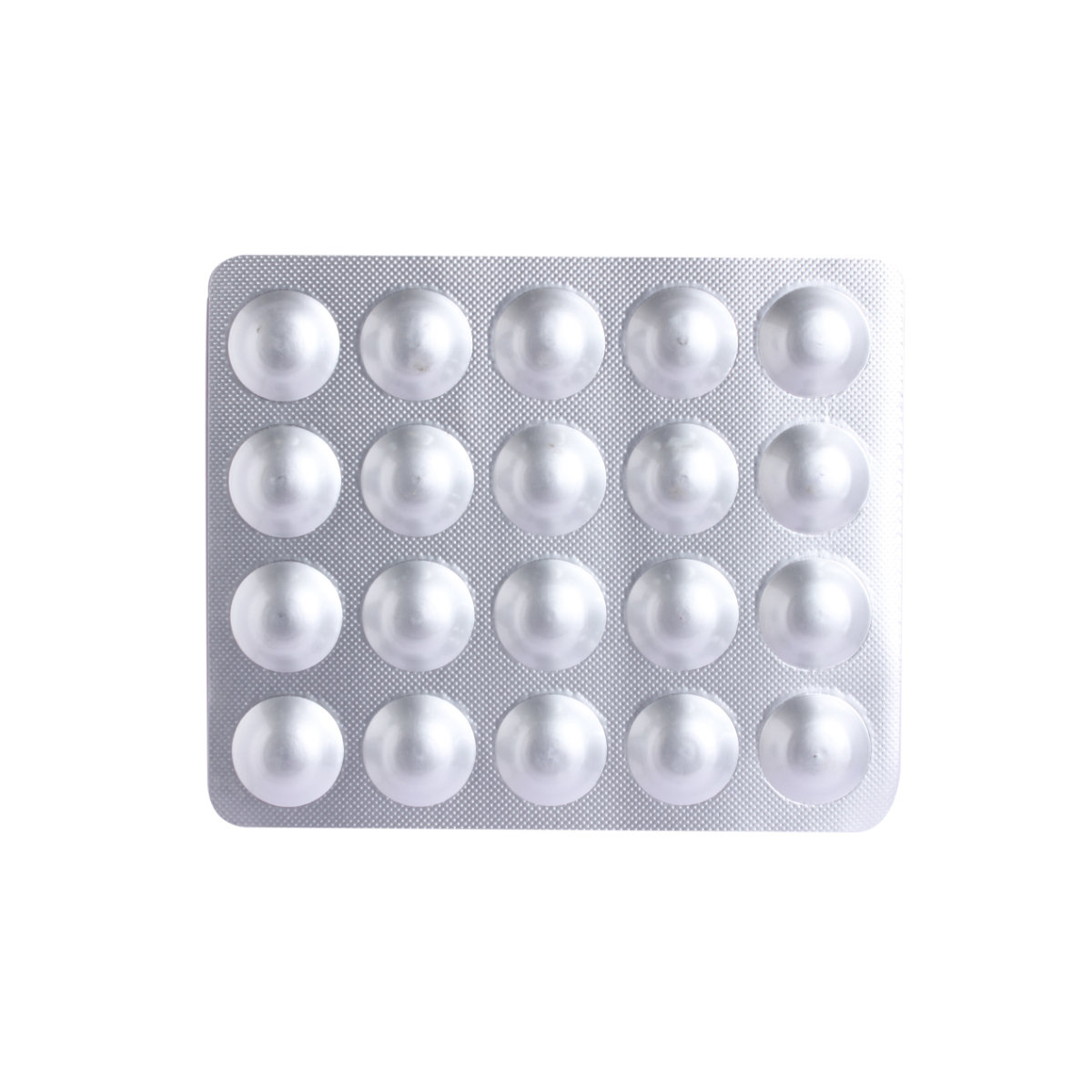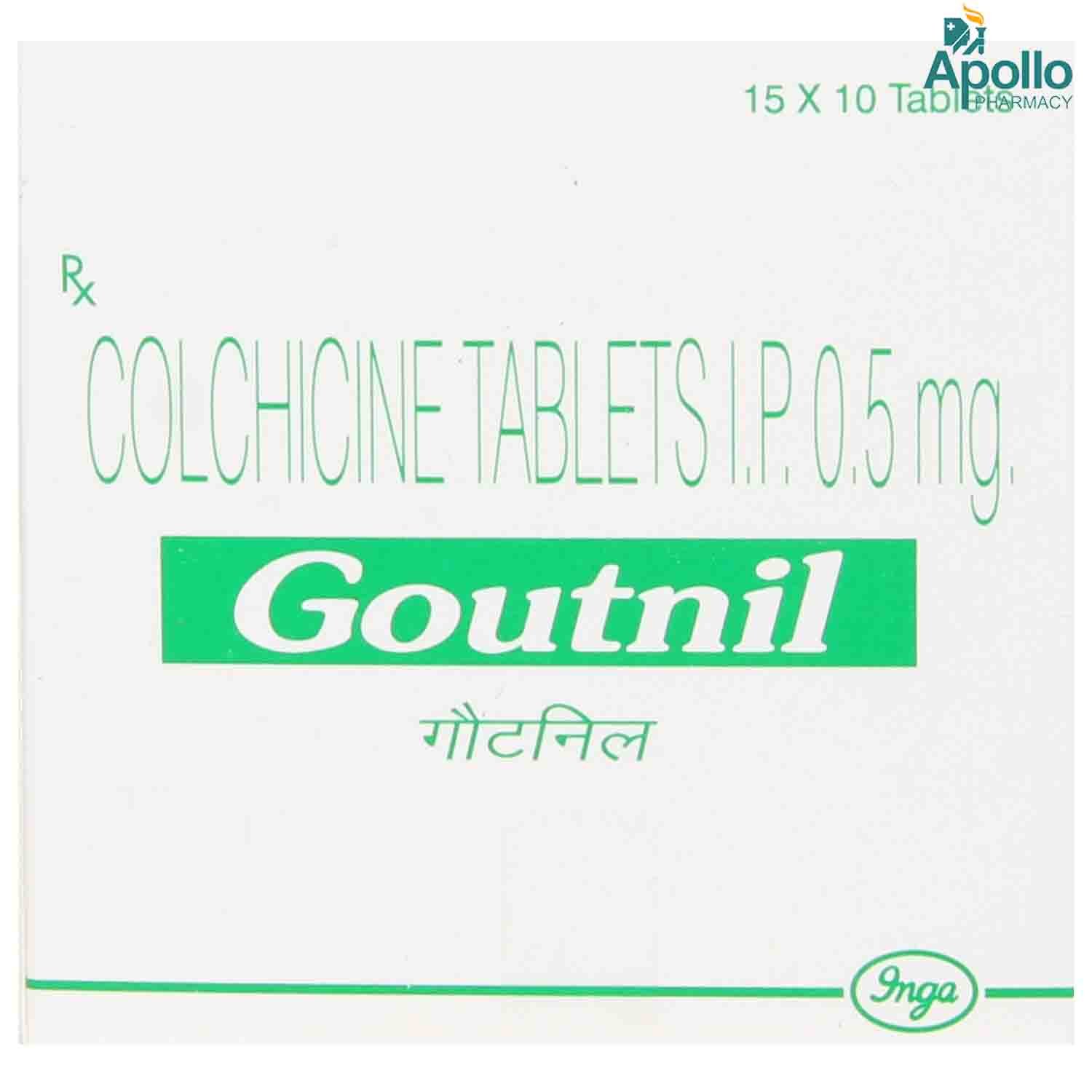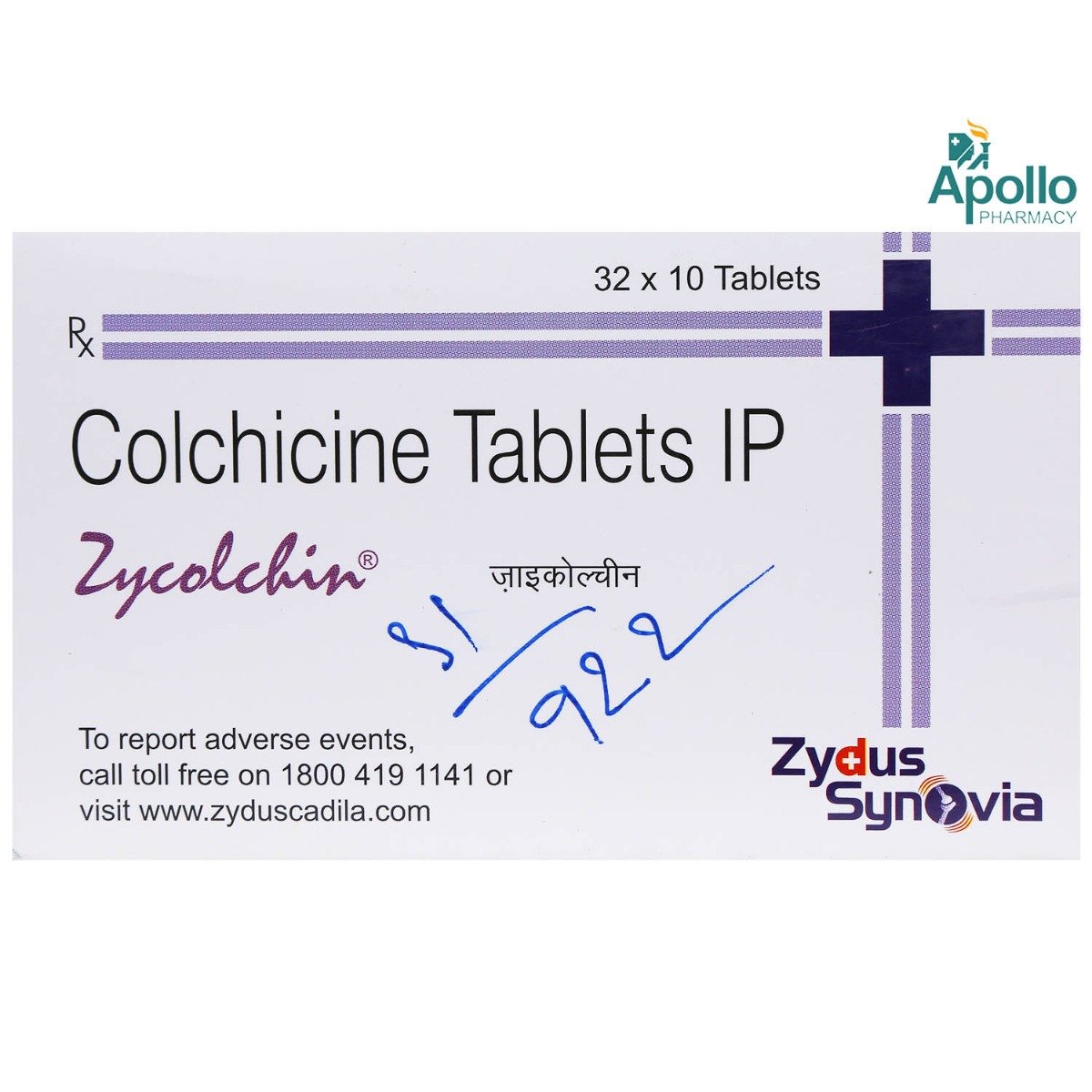Colchimap Tablet 10's
MRP ₹35
(Inclusive of all Taxes)
₹5.3 Cashback (15%)
Provide Delivery Location
Online payment accepted
 Prescription drug
Prescription drugWhats That
Composition :
Manufacturer/Marketer :
Consume Type :
Return Policy :
About Colchimap Tablet 10's
Colchimap Tablet 10's is an anti-inflammatory agent and belongs to the class of anti-gout agents. It is used in the treatment and prevention of acute attacks or flare-ups of gout. Gout is a chronic condition that occurs due to the deposition of uric acid crystals in the joints. It is characterized by intense pain and swelling in the affected joints. Colchimap Tablet 10's decreases pain, swelling, and inflammation. It also prevents sudden attacks of pain caused by acute gout.
Colchimap Tablet 10's contains Colchicine. It works by reducing the inflammation caused by crystals of uric acid in your joints. This helps to reduce pain.
Use Colchimap Tablet 10's as prescribed by your doctor. You may experience side effects such as diarrhoea, nausea, and vomiting. These effects gradually resolve over time. However, if the side effects persist, consult your doctor.
Inform your doctor if you are allergic to Colchimap Tablet 10's or any other medicines. Pregnant and breastfeeding women should use Colchimap Tablet 10's with proper consultation and caution. Keep your doctor informed about your health condition and all your medications before taking Colchimap Tablet 10's to rule out any side effects. To treat your disease effectually, continue using Colchimap Tablet 10's for as long as your doctor has prescribed it.
Uses of Colchimap Tablet 10's
Directions for Use
Key Benefits
Colchimap Tablet 10's has anti-inflammatory properties. It works by targeting white blood cells (neutrophils). It reduces the inflammation caused by uric acid crystals in the affected joints, thereby reducing pain, swelling, and inflammation.
Storage
- Inform Your Doctor: Notify your doctor immediately about your diarrhoea symptoms. This allows them to adjust your medication or provide guidance on managing side effects.
- Stay Hydrated: Drink plenty of fluids to replace lost water and electrolytes. Choose water, clear broth, and electrolyte-rich drinks. Avoid carbonated or caffeinated beverages to effectively rehydrate your body.
- Follow a Bland Diet: Eat easy-to-digest foods to help firm up your stool and settle your stomach. Try incorporating bananas, rice, applesauce, toast, plain crackers, and boiled vegetables into your diet.
- Avoid Trigger Foods: Steer clear of foods that can worsen diarrhoea, such as spicy, fatty, or greasy foods, high-fibre foods, and dairy products (especially if you're lactose intolerant).
- Practice Good Hygiene: Maintain good hygiene to prevent the spread of infection. To stay healthy, wash your hands frequently, clean and disinfect surfaces regularly, and avoid exchanging personal belongings with others.
- Take Anti-Diarrheal Medications: If your doctor advises, anti-diarrheal medications such as loperamide might help manage diarrhoea symptoms. Always follow your doctor's directions.
- Keep track of your diarrhoea symptoms. If they don't get better or worse or are accompanied by severe stomach pain, blood, or dehydration signs (like extreme thirst or dark urine), seek medical help.
- Inform your doctor about the nausea and discuss possible alternatives to the medication or adjustments to the dosage.
- Divide your daily food intake into smaller, more frequent meals to reduce nausea.
- Opt for bland, easily digestible foods like crackers, toast, plain rice, bananas, and applesauce.
- Avoid certain foods that can trigger nausea, such as fatty, greasy, spicy, and smelly foods.
- Drink plenty of fluids, such as water, clear broth, or electrolyte-rich beverages like coconut water or sports drinks.
- Use ginger (tea, ale, or candies) to help relieve nausea.
- Get adequate rest and also avoid strenuous activities that can worsen nausea.
- Talk to your doctor about taking anti-nausea medication if your nausea is severe.
- Record when your nausea occurs, what triggers it, and what provides relief to help you identify patterns and manage your symptoms more effectively.
- Drink plenty of fluids and stay hydrated.
- Avoid foods containing sugars, salts and processed food.
- Avoid consumption of alcohol.
- Take healthy diet containing fiber, carbohydrates and lean proteins.
- Exercise regularly and maintain a healthy lifestyle.
- Drink water or other clear fluids.
- To prevent worsening of pain, limit intake of tea, coffee, or alcohol.
- Include bland foods like rice, toast, crackers, and rice in your diet.
- Avoid lying down immediately after eating as it may cause indigestion or heartburn.
- Avoid acidic and spicy food as it may cause indigestion.
- Preventing Vomiting (Before it Happens)
- Take medication exactly as prescribed by your doctor. This can help minimize side effects, including vomiting.
- Having a small meal before taking your medication can help reduce nausea and vomiting.
- Talk to your doctor about taking anti-nausea medication along with your prescribed medication.
- Managing Vomiting (If it Happens)
- Try taking ginger in the form of tea, ale, or candy to help alleviate nausea and vomiting.
- What to Do if Vomiting Persists
- Consult your doctor if vomiting continues or worsens, consult the doctor for guidance on adjusting your medication or additional treatment.
- Rest well; get enough sleep.
- Eat a balanced diet and drink enough water.
- Manage stress with yoga and meditation.
- Limit alcohol and caffeine.
- Physical activities like walking or jogging might help boost energy and make you feel less tired.
- Drink plenty of water to eliminate uric acid.
- Avoid purine-rich foods such as red meat, organ meats, certain seafood (sardines, anchovies) and too much alcohol.
- Regularly do low impact exercises like swimming or walking.
- To reduce pain and swelling, apply ice packs to the affected area.
- Take rest and avoid activities that strain the affected joint.
- Elevate the affected joint to encourage fluid drainage.
- Aim for weight loss and maintain a healthy body weight to reduce the risk of gout.
Drug Warnings
Do not take Colchimap Tablet 10's if you're allergic to any ingredient in it. Colchimap Tablet 10's should not be used in patients with liver diseases as it increases the risk of muscle damage. It should be used cautiously in patients with kidney problems and blood disorders. Pregnant women, breastfeeding mothers, and children below 12 years should use only with a doctor's advice. Overdose of Colchimap Tablet 10's may lead to abdominal pain, severe nausea, bloody stools, and dizziness.
Drug-Drug Interactions
Drug-Drug Interactions
Login/Sign Up
Coadministration of Colchimap Tablet with darunavir may increase the blood levels of Colchimap Tablet, increasing the risk of serious side effects.
How to manage the interaction:
Taking Colchimap Tablet with Darunavir is not recommended, they can be taken together if advised by your doctor. However, contact your doctor if you experience abdominal pain, nausea, vomiting, diarrhea, fever, muscle pain, weakness, fatigue, and/or numbness or tingling in your hands and feet. Do not stop taking any medications without consulting a doctor.
Using Colchimap Tablet together with ketoconazole may increase the blood levels of Colchimap Tablet, increasing the risk of serious side effects.
How to manage the interaction:
Although taking Ketoconazole with Colchimap Tablet is not recommended as it can cause an interaction, they can be taken if prescribed by a doctor. However, contact a doctor if you experience abdominal pain, nausea, vomiting, diarrhea, fever, muscle pain, weakness, fatigue, and/or numbness or tingling in your hands and feet. Do not stop using any medications without consulting a doctor
Coadministration of Colchimap Tablet with clarithromycin may increase the blood levels of Colchimap Tablet, increasing the risk of serious side effects.
How to manage the interaction:
Taking Colchimap Tablet with Clarithromycin is not recommended, they can be taken together if advised by your doctor. However, contact your doctor if you experience abdominal pain, nausea, vomiting, diarrhea, fever, muscle pain, weakness, fatigue, and/or numbness or tingling in your hands and feet. Do not stop taking any medications without consulting a doctor.
Coadministration of Colchimap Tablet with itraconazole may increase the blood levels of Colchimap Tablet, increasing the risk of serious side effects.
How to manage the interaction:
Colchimap Tablet with itraconazole can be taken if prescribed by a doctor, despite the possibility of an interaction. However, contact a doctor if you experience abdominal pain, nausea, vomiting, diarrhea, fever, muscle pain, weakness, fatigue, and/or numbness or tingling in your hands and feet. Do not stop using any medications without first talking to your doctor.
Coadministration of Colchimap Tablet and pitavastatin may increase the risk of conditions.
How to manage the interaction:
Taking Colchimap Tablet with pitavastatin may possibly result in an interaction, but they can be taken together if prescribed by a doctor. However, contact a doctor immediately if you experience abdominal discomfort, nausea, vomiting, diarrhea, back pain, weakness, or tingling or numbness in your hands and feet. Do not discontinue any medication without consulting a doctor.
Coadministration of Colchimap Tablet with indinavir may increase the blood levels of Colchimap Tablet, increasing the risk of side effects.
How to manage the interaction:
Although taking Colchimap Tablet and Indinavir together may possibly result in an interaction, they can be taken together if your doctor prescribes it. However, if you experience nausea, vomiting, abdominal pain, numbness or tingling in your hands and legs, muscle pain, or weakness, contact your doctor immediately. Do not discontinue any medication without consulting your doctor.
Coadministration of Colchimap Tablet and fluvastatin can increase the risk of serious conditions that affect your muscles and kidneys.
How to manage the interaction:
Taking Colchimap Tablet with Fluvastatin may possibly result in an interaction, but they can be taken together if prescribed by your doctor. However, contact your doctor immediately if you experience abdomen discomfort, diarrhea, back pain, weakness, or tingling or numbness in your hands and feet. Do not discontinue any medication without consulting your doctor.
Taking Colchimap Tablet and Nefazodone together can increase the blood levels and effects of Colchimap Tablet.
How to manage the interaction:
Taking Colchimap Tablet with Nefazodone together can possibly result in an interaction, but it can be taken if your doctor has advised it. If you have any of these symptoms, contact your doctor right away: pain in your stomach, feeling sick, diarrhea, fever, muscle pain, feeling tired, numbness. Do not discontinue any medications without consulting your doctor.
Coadministration of Colchimap Tablet with fosamprenavir may increase the blood levels of Colchimap Tablet, increasing the risk of serious side effects.
How to manage the interaction:
Although taking Colchimap Tablet and fosamprenavir together can evidently cause an interaction, it can be taken if your doctor has suggested it. However, contact a doctor if you experience abdominal pain, diarrhea, fever, muscle pain, weakness, fatigue, and/or numbness or tingling in your hands and feet. Do not stop using any medications without first talking to your doctor.
Coadministration of Colchimap Tablet with Atazanavir results in increased Colchimap Tablet levels in the blood, leading to increased side effects of Colchimap Tablet.
How to manage the interaction:
Although taking Colchimap Tablet and Atazanavir together may result in an interaction, they can be taken together if your doctor prescribes it. However, if you experience any signs and symptoms related to the increased effects of Colchimap Tablet, like nausea, vomiting, numbness or tingling in your hands and legs, muscle pain, or weakness, contact your doctor immediately. Do not discontinue any medication without consulting your doctor.
Drug-Food Interactions
Drug-Food Interactions
Login/Sign Up
Grapefruit Juice
How to manage the interaction:
Consuming excessive quantities of grapefruit juice can raise the levels of Colchimap Tablet in your blood, increasing the risk of side effects. Avoid the consumption of grapefruit juice while taking Colchimap Tablet.
Diet & Lifestyle Advise
- Maintain a healthy body weight because obesity can lead to joint pain. Please avoid strenuous exercise as it may aggravate your arthritis-related joint pain. Instead, you can stretch and engage in low-impact aerobic activities such as treadmill walking, biking, and swimming. Lifting light weights can also help to improve your muscle strength.
- Increase your intake of glucosamine, chondroitin sulphate, vitamin D, and calcium-rich supplements. Aside from that, turmeric and fish oils can help to reduce tissue inflammation.
- Include fish such as salmon, trout, tuna, and sardines in your diet if you have arthritis or joint pain. These fish are high in omega-3 fatty acids, which aid in the reduction of inflammation (redness and swelling) and the protection of the heart.
- Your sitting posture is critical, especially if you suffer from pain or inflammation. Try to sit as little as possible and only for a short period of time (10-15 min). Place a rolled-up towel at the back of your curve to alleviate pain. In addition, if necessary, a footrest can be used.
- Follow heat or cold therapy by regularly applying a cold or hot compress to the joints for 15-20 minutes.
- Relax by meditating, reading, enjoying a bubble bath, or listening to calming music.
- Avoid drinking alcohol and quit smoking.
Side Effects of Colchimap Tablet 10's
- Nausea
- Vomiting
- Diarrhea
- Abdominal pain
- Fatigue
Habit Forming
Therapeutic Class
All Substitutes & Brand Comparisons
RX
Out of StockColchicindon 0.5mg Tablet
Zydus Cadila
₹12.29
(₹1.11 per unit)
68% CHEAPERRX
Out of StockColjoy 0.5mg Tablet
Cadila Pharmaceuticals Ltd
₹22.36
(₹2.01 per unit)
42% CHEAPERRX
Out of StockColchigout 0.5 Tablet 10's
Prevego Healthcare & Research Pvt Ltd
₹32.5
(₹2.93 per unit)
16% CHEAPER
Drug-Diseases Interactions
Drug-Diseases Interactions
Login/Sign Up
FAQs
Drug-Drug Interactions Checker List
- CYCLOSPORINE
- CLARITHROMYCIN
- NEFAZODONE
- ATORVASTATIN
- DIGOXIN
- ROSUVASTATIN
- KETOCONAZOLE
- ITRACONAZOLE
- IBUPROFEN
- NAPROXEN
- DISULFIRAM
Disease/Condition Glossary
Gout is a type of arthritis in which patients experience severe pain, redness, and swelling in joints. The most common affected area is the joint at the base of the big toe. It occurs due to a condition called hyperuricemia (high uric acid levels in the body). The excess uric acid deposit and crystallize in the joints leading to pain and inflammation. Patients with gout may often experience acute attacks that result in sudden and severe pain.

Have a query?
Alcohol
Safe if prescribed
Alcohol may affect Colchimap Tablet 10's effectiveness. So, people should avoid taking alcohol while using Colchimap Tablet 10's.
Pregnancy
Consult your doctor
Please consult the doctor. Colchimap Tablet 10's should be used in pregnant women only if clinically needed, and the benefits outweigh the risks.
Breast Feeding
Consult your doctor
Please consult the doctor. Colchimap Tablet 10's should be used in nursing mothers only if clinically needed, and the benefits outweigh the risks.
Driving
Safe if prescribed
Colchimap Tablet 10's will not affect your ability to drive or operate machinery. However, do not drive or operate machinery if you feel sleepy or dizzy after taking your medicine.
Liver
Consult your doctor
Colchimap Tablet 10's may cause liver damage. So, it should be advised with caution in patients with liver diseases.
Kidney
Consult your doctor
Colchimap Tablet 10's should be used with caution in patients with renal impairment. The doctor may adjust the dose depending on your condition.
Children
Safe if prescribed
Colchimap Tablet 10's should be used in children below 12 years only when prescribed by a child specialist.








